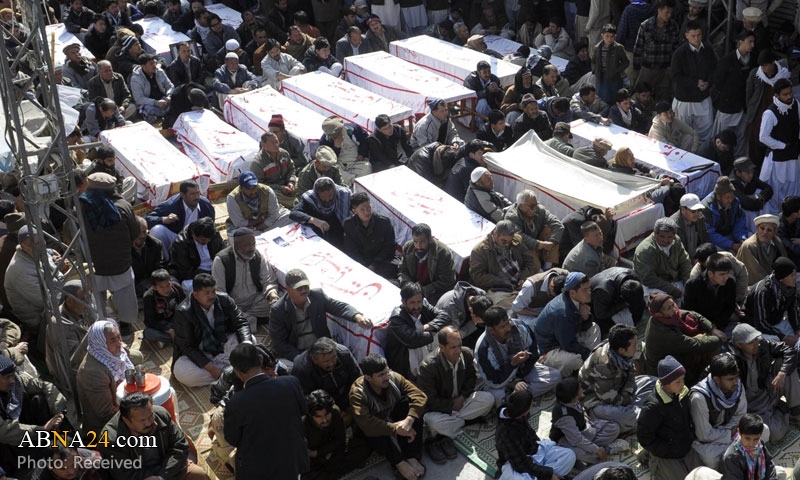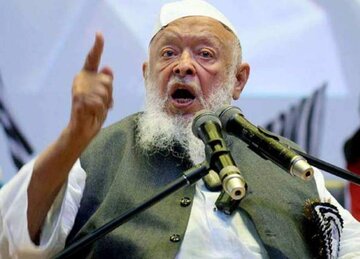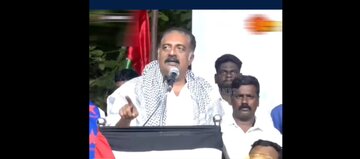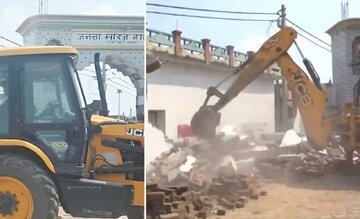QUETTA, Pakistan (AhlulBayt News Agency) - Chief Justice of Pakistan (CJP) Mian Saqib Nisar on Friday termed the killings of Hazara Shia Muslims in Quetta “ethnic cleansing”, saying he was at a loss of words to express his feelings against the genocide of the minority community, based in the provincial capital of Balochistan.
A two-member bench headed by Chief Justice Nisar, comprising Justice Ijazul Hasan, heard the suo motu notice at Supreme Court’s Quetta Registry.
“We do not have words to condemn the incidents of Shia killings,” said the CJP.
“For me, this is ethnic cleansing and thus I had to take suo motu of the targeted killings of the Hazara community in Quetta,” the CJP remarked.
A report on Hazara Shia killings was submitted to the court by Quetta Balochistan Inspector (IG) General Moazzam Jah Ansari on the CJP’s orders. According to the report, 399 Shia Muslims from the Hazara community have been martyred in targeted attacks during the past six years.
According to the report, nine people from the Hazara community have been murdered in the past four months.
The IGP said 2013 was the bloodiest year for Hazaras, wherein at least 208 Hazaras were killed. “However, there has been a significant improvement in the security situation since then,” he added, saying that the province has seen only nine Hazara killings in the last four month.
Over the course of the hearing, the counsel for the Hazara Shia community, Advocate Iftikhar Ali, presented also his arguments before the court. “We are being deprived of our lives and property; our community members have been forced to leave the country and travel to Australia,” Ali told the court.
“We are responsible for ensuring safety of life and property of the Hazara community. All agencies are advised to submit a report detailing the issue,” Justice Nisar ordered.
The bench was also informed that authorities had stripped security from the leaders of the community. “We have been subjected to targeted killings for the past 20 years, but the authorities have not apprehended anyone,” Ali argued. The deputy inspector-general (DIG) of Quetta, however, denied the claim that security was withdrawn.
“If the government cannot ensure security for the Shia Muslims then it must devise mechanisms to ensure their survival,” Justice Nisar remarked.
Advocate Ali told the court that the security plan of 2013 wasn’t implemented which is why the problem remains unsolved. “If the 2013 security plan is implemented in its spirit, we can witness significant improvements,” he added. The CJP advised the authorities to review the plan and ensure its implementation.
Qayyum Changezi, another representative of the Hazara community who appeared in court, said that the terrorists who had been convicted in terrorism cases were still not punished. He further lamented that the families of the martyrs had not been given jobs.
The CJP assured Ali that the court would form a committee if needed and ordered the law enforcement agencies to submit a report on the targeting of the Hazara community.
However, Hazara Democratic Party leader retired Major Nadir Ali told the court that a joint investigation committee had been formed to investigate targeted attacks against the Hazara community, yet nothing had been done. The case was adjourned until after Eid.
Hearing a separate petition filed by a Hazara woman whose husband has reportedly been missing, the CJP advised IG Ansari and FC Brigadier to contact the Inter-Services Intelligence (ISI) for assistance on the matter. “We cannot exist peacefully without state institutions,” the CJP said in his remarks. “We should not consider them as our enemies.”
On May 2, the chief justice took the suo motu notice of the killings, saying, “I have just met members of the Shia community; they are so scared that they are not even approaching the Supreme Court.”
“The killers of Hazara Shia community are holding rallies out in the open,” he had added, lamenting that the ostracised community members were not being given admission in universities.
“They can’t go to schools or hospitals. Are they not citizens of Pakistan?”
Earlier, at least six people were killed and three wounded in different incidents of targeted killings in the provincial capital, spreading a wave of terror.
As a result, Shia Muslims began protesting against the continued spate of killings against the minority community. Apart from the sit-in outside the assembly, a social activist Advocate Jalila Haider-led hunger strike was also being staged by Shia Muslim women outside the Quetta Press Club.
The protesters wished for an immediate end to targeted killings of Shia Muslims specially Hazaras and arrest of every culprit involved in the heinous acts.
The protest was called off after the assurances from Chief of the Army Staff (COAS) Qamar Javed Bajwa.
The state is responsible for the security of its citizens, Bajwa had said.
Sectarian terrorism in Balochistan has disproportionately targeted people from the Hazara Shia community.
A National Commission for Human Rights (NCHR) report released in March stated that at least 509 members of Hazara Shia community were killed and 627 injured in various incidents of terrorism in Quetta during the last five years.
/129
12 May 2018 - 08:15
News ID: 893114

Chief Justice of Pakistan (CJP) Mian Saqib Nisar on Friday termed the killings of Hazara Shia Muslims in Quetta “ethnic cleansing”, saying he was at a loss of words to express his feelings against the genocide of the minority community, based in the provincial capital of Balochistan.
X




